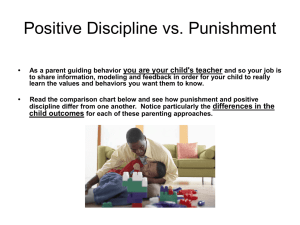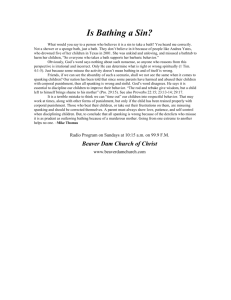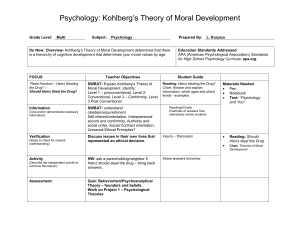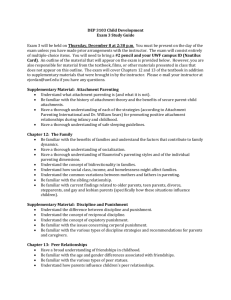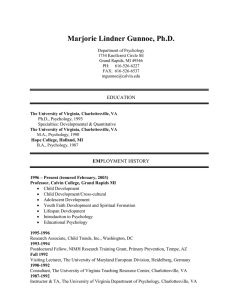Psychology - Mr. Pitner
advertisement
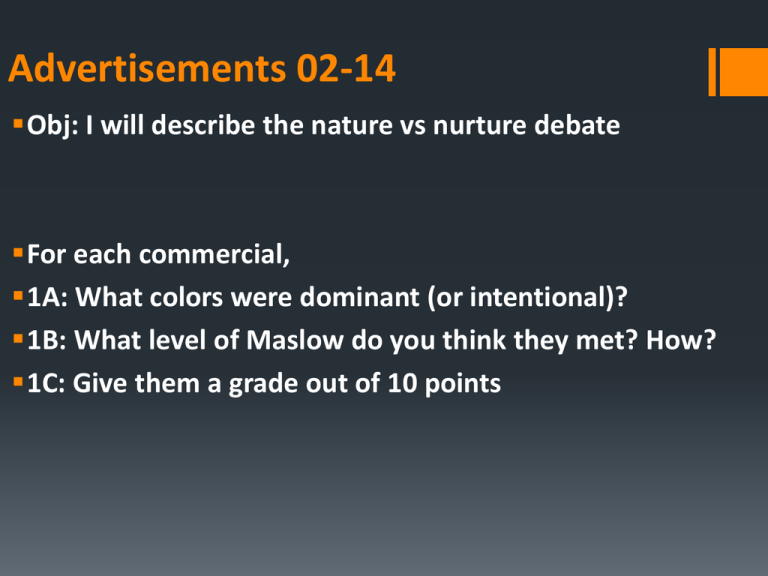
Advertisements 02-14 Obj: I will describe the nature vs nurture debate For each commercial, 1A: What colors were dominant (or intentional)? 1B: What level of Maslow do you think they met? How? 1C: Give them a grade out of 10 points Ch. 10 Development Notes The person you are today, is it more of a result of your parent's genes or how you were raised? (T/P/S) 1. Describe the Nature vs. Nurture debate 2. The video talks about eugenics in the NvN debate. Define eugenics 2B: Eugenics would probably fall on the nature/nurture side. Why? 3. 10.3 Social Development (Textbook pgs.284-286) Read the section & fully explain A. Attachment(secure & insecure attachment) B. Anxiety (stranger & separation) C. Contact Comfort D. Imprinting Videos Harlow: Nature vs nurture (and monkeys) http://www.youtube.com/watch?v=OrNBEhzjg8I Santa: Not so jolly? http://www.youtube.com/watch?v=YO0oquE14j0 Anxiety? https://www.youtube.com/watch?v=Y6QtuU1L_A8 Ch 10.3 Social Development Address the videos or something else you learned on your weekly RAFT: Choose your: Role (Psychologist, worker, student, boss, zoo keeper,etc), Audience (who will read it) Format (e-mail, pamphlet, handbook, song, poem, picture, etc) Title (summarizes) Superstardom (Shows your abilities) Then complete your chosen Format by Including at least 3 terms from 10.3 with the terms underlined. *****Must show clear understanding and effort for full credit. 2/19 Obj: I will debate corporal punishment #1: Think about your parents/guardians parenting style. Describe their rewards, punishments, effectiveness, etc. T/P/S There are 4 types: A. Authoritative (Warm) B. Authoritarian (Strict) C. Neglectful (Cold) D. Indulgent (Permissive) Parenting Styles (notes and questions) P288 #2: for each of the following parenting styles, draw a parent demonstrating the style, followed by a drawing of a student A. Authoritative (Warm) B. Authoritarian (Strict) C. Neglectful (Cold) D. Indulgent (Permissive) Parents typically fall somewhere in the middle of the styles Authoritative Parenting style which encourages adolescents to be independent but still places limits on their actions. This parenting involves rules and expectations combined with warmth and love. Result: Children are generally more confident, take more reasonable risks, adjust well socially, and do better in school, etc Authoritarian Parenting style in which the parent serves primarily as a disciplinarian and rule giver. Very little warmth and affection are given. Results: Children sometimes may fear or resent the parent. Children have lower self-esteem, have trouble with independence, fail to initiate activities, and may have poor communication skills. Neglectful Parenting in which the parent is not involved in the child’s life. The parent may have few rules and expectations, has a hands-off approach and gives the impression that they don’t really care. Result: Children may feel unwanted and hurt. They may also show low self control and do not handle independence well… because of a lack of boundaries they may have little direction in their lives or have trouble adjusting to society. Indulgent Parenting Parenting style in which parents are highly involved in their kids’ lives and place few demands and controls on them. Parents may provide their children with an abundance of love, material, and admiration. In fact, they may “over indulge” in this. They may go out of their way to make sure that their children get everything they want Result: Children may show a lack of control and empathy (understanding feelings of others), may be socially incompetent, and may always expect to get their way. Questions for your weekly 3A. Experts believe that concerned authoritative parents develop better children than parents who are concerned and permissive. Do you agree with the experts? 3B: Why? 4A: Due to concern about child abuse and the values that we teach our children, many experts believe that children should not be spanked. Do you agree? 4B: Explain 5. List 5 types of discipline you feel are effective. 6A. Is negative/positive reinforcement or punishment more effective in shaping behavior? 6B. How? 7. As a teenager, what secret advice would you share with adults that would make them better parents? Matching assessment “quiz”: #8 These children often lack boundaries and can feel unwanted Do your homework and clean the dishes. Later we’ll take you guys out for some pizza. Our daughter may be a drug addict, but that’s her choice and we still love her A: Authoritative B: Authoritarian It was your birthday last week? What’s your age again? C: Neglectful Take the car, but you’re only limited to $500 from the ATM and D: Indulgent E: Child of A you have to be back by 2 AM AB: Child of B If you go to THAT school don’t bother calling us because we AC: Child of C won’t talk with you. AD: Child of D I went on a date the other night. I don't think he liked me too much, but there’s other fish in the sea. I don’t care what you think. If you don’t do what I say you’re grounded. I’m the parent, you’re the child! Give me that truck! It’s mine! Mine! Mine! Mine! You get the wagon ‘cause you’re stupid! Nice job son, you get a sticker. Thanks for taking out the garbage. CLASS DEBATE (group talk, send rep) ·CHOOSE A SIDE · Stand on the side of the issue you most agree with. ·Move to the middle if unsure or can’t decide. ·By the end you must choose a side. (can be almost in middle) ·You can switch sides during if you are convinced by an argument ·DEBATE RULES ·Need ball to comment / speak ·Debate goes back and forth after each comment (call person’s name before tossing the ball) ·No personal attacks. Briefly summarize the other sides view and then give your perspective. Ex: From what I heard you were saying …. Well I think that _______. BE SPECIFIC ·Speaking out of turn or rudely will result in a reduced participation score or worse ·Debate ends when I call time Pro-Spanking Studies May Have Global Effect Thursday, 07 Jan 2010 By Theodore Kettle A study entailing 2,600 interviews pertaining to corporal punishment, including the questioning of 179 teenagers about getting spanked and smacked by their parents, was conducted by Marjorie Gunnoe, professor of psychology at Calvin College in Grand Rapids, Michigan. Gunnoe’s findings, announced this week: “The claims made for not spanking children fail to hold up. They are not consistent with the data.” Those who were physically disciplined performed better than those who weren’t in a whole series of categories, including school grades, an optimistic outlook on life, the willingness to perform volunteer work, and the ambition to attend college, Gunnoe found. And they performed no worse than those who weren’t spanked in areas like early sexual activity, getting into fights, and becoming depressed. She found little difference between the sexes or races. Gunnoe’s findings are being largely ignored by the U.S. media, but made a splash in British newspapers. Nor is she alone in her conclusions. Dr. Diana Baumrind of the University of California, Berkeley and her teams conducted what is considered the most extensive and thorough child development study yet done. They examined 164 families, tracking their children from age four to 14. Baumrind found that spanking can be helpful in certain contexts and discovered “no evidence for unique detrimental effects of normative physical punishment.” She also found that children who were never spanked tended to have behavioral problems, and were not more competent than their peers. Topic 1: Child punishment: spanking For Against #9: Which side do you think “won” the argument? #9B: How did they win? Is Corporal Punishment an Effective Means of Discipline? Authors Elizabeth Gershoff and Robert Larzelere analyzed 62 years worth of collected data from 88 studies on corporal punishment to determine the efficacy of spanking a child. "There is general consensus that corporal punishment is effective in getting children to comply immediately while at the same time there is caution from child abuse researchers that corporal punishment by its nature can escalate into physical maltreatment, " Gershoff writes. " APA. What are the effects on children who are disciplined with physical punishment? For instance, are they more likely to be aggressive with their siblings, peers or others? Dr. Kazdin. Research on very mild, infrequent spanking (e.g., one time/month) is inconclusive. When a parent moves beyond that to moderate or severe physical punishment, there are all sorts of untoward consequences—educational delays, psychological disorders and physical disorders, too. APA. What do you say to the parent who says, “My parents spanked me, and I turned out OK?” Dr. Kazdin. There are people who smoke cigarettes and live to be 100 but that does not refute the findings that smoking is likely to lead to early death. Exceptions are interesting (some people who contract HIV do not get AIDS) but they do not alter the finding and it would be foolhardy to think that one is an exception. Topic 2: Corporal Punishment in school For Against #9: Which side do you think “won” the argument? #9B: How did they win? Parenting Styles Application RAFT: Choose your: Role (Psychologist, worker, student, boss, zoo keeper,etc), Audience (who will read it) Format (e-mail, pamphlet, handbook, song, poem, picture, etc) Title (summarizes) Superstardom (Shows your abilities) Then complete your chosen Format by Including at least 2 Parenting styles Pros & Cons with the terms underlined. **Must show clear understanding and effort for full credit. Wednesday, Feb 19: Entry Task Discuss with your group… What was your favorite toy as a child (or sibling’s favorite)? For 2 age ranges: 0-5 and 6+ P296 Ch4 10.4 Cognitive Dev. Notes SPCF #1: What stage of development is shown in the cartoon? #2-6: Toys Lab Toy Type:________ 1. Appropriate Ages toy is designed for: 2. Maturative physical abilities needed for child to interact with this toy (List) 3. Appropriate Cognitive Stage toy is designed for: [S.P.C.F] Why (abilities needed for toy interaction and/or skill mastered)? 4. Rate the toy 1-10 on how “Good” of a toy it is in relation to helping the child develop. 1=bad Explanation: REPEAT FOR EACH STATION Analysis What did you learn from this lab? Do you believe children should construct the world at their own pace through play or should adults expose their children to as much as possible? Explain your answer. if absent: Analyze 7 children’s toys using criteria above Entry Task Thursday 2/21 #1: Define morality (or morals) #1B: Why do different people react differently to a “he said/she said” story? When done writing, share with your group Heinz Dilemma #3A: What is the dilemma? #3B: Should Heinz steal the drug? Y/N/Maybe Form a group with others that have your answer: Yes, No, Not sure Heinz dilemma story In Europe, a woman was near death from cancer. One drug might save her, a form of radium that a druggist in the same town had recently discovered. The druggist was charging $2,000, ten times what the drug cost him to make. The sick woman’s husband, Heinz, went to everyone he knew to borrow the money, but he could only get together about half of what it cost. He told the druggist that his wife was dying and asked him to sell it cheaper or let him to sell it cheaper or let him pay later. But the druggist said, “No.” The husband got desperate and broke into the man’s store to steal the drug for his wife. Should the husband have done that? Why? Heinz Dilemma – discuss with group, then write your decision (made together) #4: (entire page) 1. Should Heinz steal the drug? 2. If Heinz doesn't love his wife, should he steal the drug for her? Why or why not? 3. Suppose the person dying is not his wife but a stranger. Should Heinz steal the drug for a stranger? Why or why not? 4. Suppose it is a pet animal he loves. Should Heinz steal to save the pet animal? Why or why not? 5. Why should people do everything they can to save another's life? 6. It is against the law for Heinz to steal? Does that make it morally wrong? Why or why not? 7. Why should people generally do everything they can to avoid breaking the law? How does this relate to Heinz's case? 3 levels (6 stages) of morality: Kohlberg Kohlberg & Psych Class IF Jacobs Psych Students are given a moral dilemma boys girls according to Kohlberg, THEN _____will score on average of .2 stages higher. 3.1 vs. 3.3 Kohlberg’s death Contracted a disease from a tropical parasite while visiting Belize Suffered from depression Asked for a one day leave from hospital he was admitted to Drowned himself in Boston Harbor in 1987 Kohlberg’s Stages #6: Make a cartoon demonstrating each of the stages of Kohlberg’s theory of morality without using my examples: Friday 02-22: Obj: I will define identity crisis How many have thought about what you will do with their lives after high school? How many are currently debating but have not made a decision what you will do college or career wise after you graduate high school? How many know exactly what career they want to pursue when you graduate high school or college? How many are pursuing college or a career at your parents suggestion? How many don’t care or aren’t worried about what you will do after high school? How many know what political party you will support when they are 18? What friends are you going to have after you graduate high school? Identity Crisis and BC: #1: Describe the 5 different types of identity formation ID formation/crisis – Period of inner conflict during which adolescents worry intensely about who they are ID achievement – Reconsidering goals and values set by parents and culture. Accepting some and rejecting others. ID moratorium – Searching for id, exploring alternatives, or delaying commitments ID foreclosure – Acceptance of parents or society roles without questioning or exploring alternatives ID Diffusion – When adolescent does not seem to know or care about their identity. Few commitments to goals or values of parents, peers, or society. Entry Task: Which type of identity crisis is being shown in the picture? Breakfast Club Analysis Answer the following for each character in the film: Find the parenting style they grew up with, what stage of id formation they have, and what stage of moral development each character has. Stereotypes: “Jock, Princess, Brain, Criminal, Basketcase” Stereotype (given), name (you fill in) “The Jock” _Name_ Parenting Style Stage of Identity formation Stage of Moral development Indulgent, authoritative, etc ID Achievement, foreclosure, diffusion etc Stage 1-6 Evidence Evidence Evidence Example. Example. Example. Tuesday Feb 26 12.4 Death and Dying Notes #1: Old age is like________ because__________ (create a simile) The last lecture Video Death and Dying #2: How did Randy Pausch appear to handle the news of his impending death? How did People Respond? "Now or Never" Rob Corn Debora Cahn May 14, 2009 (2009-05-14) The doctors focus on the victim of a near-fatal traffic accident who is disfigured and unable to speak. Meredith discovers it's George, who was hit by a bus while saving the woman who accompanied him to the hospital. The episode ends with both George and Izzie flatlining and meeting up with each other in a heaven-like scene, with no definite indication of whether either or both are dead or alive. George O'Malley (T. R. Knight) - Burn Victim , Izzie Stevens (Katherine Heigl) - Brain Cancer Callie Torres (Sara Ramírez) - George's ex wife who breaks down Elisabeth Kubler-Ross: 1924-2004 #4: 5 Stages of Dying & Grief: Robot Chicken? 1. 2. 3. 4. 5. #5: 12.4 Death and Dying App. A. Read Jack Kevorkian’s article and answer the 3 questions that go along with it. B. Ethical Dilemma: Someone you love (parent, sibling, or girlfriend/boyfriend) is terminally ill and in pain. They ask you to assist in their death. Using Kohlberg’s theory of Moral development: what do you do & what level is your decision? C. Describe the stages of grief that you, a family member, or a friend went through when someone close died? (Describe each stage that was experienced and what was said or done as evidence) Test is tomorrow! Review guide (handout)
